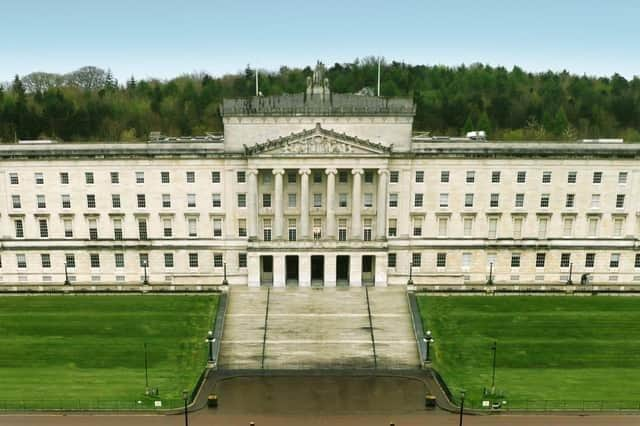Brian M Walker: The challenge for unionists is to keep on showing voters the importance of the Union


Apparently, before they will return to Stormont, members of the DUP want some legislation or assurances to strengthen the Union. What they should understand is that the Belfast/Good Friday Agreement provides very substantial constitutional security for the Union.
Today unionists enjoy greater constitutional certainty than that experienced in the past, by those great leaders of unionism, James Craig, John Andrews and Basil Brooke.
Advertisement
Hide AdAdvertisement
Hide AdThe Government of Ireland Act of 1920 established Northern Ireland with its own government and parliament. Subsequently, over the heads of unionists, the Anglo-Irish Treaty of 1921 led to the establishment of a boundary commission which could have drastically reduced the size of Northern Ireland and made it unviable.
In the end the commission had no effect on the Northern Ireland boundaries but this incident revealed the constitutional weakness of the unionist position. This became even more apparent in the early years of the second world war.
Twice, as Paul Bew has described, the British government, faced with a desperate military situation, offered to Eamon de Valera a united Ireland in return for the south joining the allied war effort. This did not happen, not due to unionist opposition, but because de Valera turned down the offer.
In 1949, in gratitude for the Northern Ireland contribution to the war effort, and in response to the south declaring a republic, Westminster passed the Ireland act which affirmed that in no event would Northern Ireland cease to be part of the UK ‘without the consent of the Parliament of Northern Ireland’.
Advertisement
Hide AdAdvertisement
Hide AdIn 1972, however, the Northern Ireland parliament was prorogued and direct rule introduced. An assembly and a convention followed but failed to survive.
In 1998 the Belfast/ Good Friday Agreement set down new political arrangements for the government of Northern Ireland. These arrangements included important constitutional guarantees of Northern Ireland’s future.
The Belfast Agreement acknowledged that ‘the present wish of a majority of the people of Northern Ireland….is to maintain the union’ and that ‘it would be wrong to make any change to the status of Northern Ireland save with the consent of a majority of its people’ (by voting in a border poll).
This constitutional status was ratified in subsequent British legislation. It is a stronger position than that stated under the 1949 Ireland Act which had talked of the consent of the Northern Ireland parliament.
Advertisement
Hide AdAdvertisement
Hide AdUnionist parties no longer have a majority in the assembly. But the ARIS political opinion poll from early December 2022, and other polls since, show that a clear majority of the people of Northern Ireland are in support of the union with Great Britain. This fact is the single strongest guarantee of the Union.
Crucially, these new constitutional arrangements were accepted by all the participants at the talks, including nationalists and republicans. At referenda, north and south, the Belfast Agreement was approved by sizeable majorities. Important also were revised articles in the Irish constitution which replaced territorial claims on Northern Ireland with acceptance of the principle of consent.
Another factor which apparently has prevented unionists returning to the assembly and government is a reluctance to serve as deputy first minister alongside a Sinn Fein first minister. Given their history it is remarkable that Sinn Fein are now keen that one of their members should become first minister of Northern Ireland.
How would Craig have responded to such a situation? Certainly he would have been very surprised. Neither nationalists nor republicans attended the official opening of the new Northern Ireland parliament.
Advertisement
Hide AdAdvertisement
Hide AdAt the same time it is very possible that he would have welcomed such a move. In a speech in the Belfast Reform Club in February 1921 he declared that: ‘It will only be by broad, tolerant ideas and a real desire for liberty of conscience that we can make an ideal of the parliament and the executive’.
In his July 12, 1923 message he said: ‘It is our earnest desire to live in peace and amity with the Free State and to encourage in every way a better understanding between all classes and creeds’.
During the 1920s he remained on good terms with the south, ‘our friendly neighbours’, as he called them on July 12, 1927. This changed with the arrival of de Valera’s government, his rejection of the idea of consent for the people of Northern Ireland and the territorial claim on the north as contained in the Irish constitution.
Southern nationalists today, such as Taoiseach Leo Varadkar, still want a united Ireland. But crucially, unlike de Valera, they fully accept the principle of the consent of a majority of people of Northern Ireland as to their constitutional future.
Advertisement
Hide AdAdvertisement
Hide AdWhatever its flaws, the Belfast Agreement brought many benefits. Most importantly it gave a degree of constitutional certainty which had not existed before. As long as a majority of the people value and want to maintain the Union, then it will survive and prosper.
The challenge for unionists is to keep on showing the voters its importance. A fully working assembly and government is the best way to promote Northern Ireland and the Union.
Lord Craigavon is usually associated with cries such as ‘Not an inch’ or ‘No surrender’. But we would do well to remember his last words, literally from the grave. At the entrance to his tomb in the Stormont grounds, are inscribed the words of his family motto ‘Charity provokes charity’.
This is a very Ulster way of saying that good deeds or charitable efforts will ‘provoke’ or lead to good deeds or charitable efforts from your opponent. All our politicians could do well to heed these words today.
Professor Emeritus Brian M Walker is a former member of the Queen’s politics school